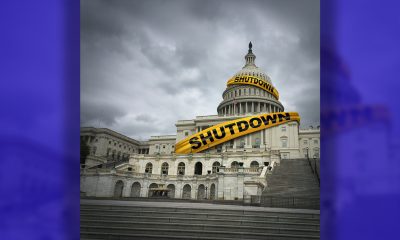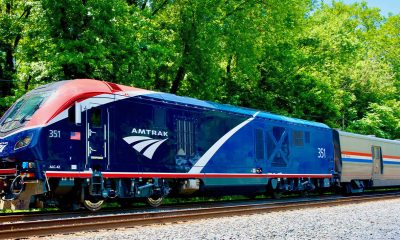Black History
COMMENTARY: Divisions Set in Concrete and Pavement
The racial divisions that have split our country for centuries don’t just live in people’s hearts and heads. Some of them exist in concrete and pavement running right through certain neighborhoods. They are structural racism in the most tangible sense.

By Ben Jealous
The racial divisions that have split our country for centuries don’t just live in people’s hearts and heads. Some of them exist in concrete and pavement running right through certain neighborhoods. They are structural racism in the most tangible sense.
In Milwaukee last month, local activists told me about their fight against that kind of division. Wisconsin’s transportation department wants to expand a crumbling 3.5-mile stretch of Interstate 94 running through the state’s largest city at a cost of $1.2 billion and about 49 acres of land in the neighborhoods adjoining the roadway.
Like Overton in Miami, East Los Angeles and West Montgomery, Alabama, those neighborhoods, home to poor black and brown residents, were subdivided 60 years ago when I-94 was built. The highway continues to cut them off today.
It’s disingenuous to make plans today that don’t consider the history of these highways in places like Milwaukee. The cost to locate interstates, built as courts were ordering desegregation of public schools and housing, was borne by communities of color whose residents were barred from home loans that would have let them move to suburbs that got disproportionate benefit from faster commutes. Planners used code words like blight, renewal, and efficiency to confuse that reality.
A highway project like this creates an actual intersection between creating more equitable communities and protecting the planet. Public works projects that encourage more traffic increase air pollution that impacts our climate, increase noise pollution, and add to flooding and contaminated run-off that damage swimmable, fishable rivers. Those who live closest breathe the most exhaust and live with the constant drone of traffic, but the environmental impact unquestionably stretches far wider.
The estimated cost of expanding I-94 is about $40 million more than fixing the existing six lanes. That’s the same amount that a 50% cut in the current state budget cost mass transit systems in Madison and Milwaukee. Most Milwaukee mass transit riders are workers riding to a job or the disabled and seniors who no longer drive. While black and brown riders make up a disproportionate share of the total, most riders are white.
When we see these fabricated divisions, the question we should ask is who benefits from creating them? We know from troubling experience that the self-interested find ways to separate us even when our interests are the same. Who benefits from a wider interstate? It’s clearly not its neighbors. Not the Milwaukee City Council who opposed the plan. Not drivers today or in years to come as updating the current highway without adding lanes will improve safety and reduce congestion. And not millennials that Wisconsin has spent millions to retain and attract who say they want to live in places that don’t demand driving.
A local issue like this one in Wisconsin matters even if you live three states away because one like it may be coming to where you live soon. We’re on the cusp of many more in every state. Historic federal funding in 2021 and 2022 to repair infrastructure and invest in a cleaner economy must be spent place by place. We need to follow the example of the folks I met in Milwaukee — stay vigilant, never assume that decisions will be made in the best interest of everyone or the planet, build the biggest coalitions we can, and hold officials accountable when we vote.
Ben Jealous is the incoming executive director of the Sierra Club, the oldest and most influential grassroots environmental organization in the country. He is a professor of practice at the University of Pennsylvania and author of “Never Forget Our People Were Always Free,” published in January
Activism
Oakland Post: Week of November 26 – December 2, 2025
The printed Weekly Edition of the Oakland Post: Week of November 26 – December 2, 2025

To enlarge your view of this issue, use the slider, magnifying glass icon or full page icon in the lower right corner of the browser window.
Activism
Oakland Post: Week of November 19 – 25, 2025
The printed Weekly Edition of the Oakland Post: Week of November 19 – 25, 2025

To enlarge your view of this issue, use the slider, magnifying glass icon or full page icon in the lower right corner of the browser window.
Activism
IN MEMORIAM: William ‘Bill’ Patterson, 94
Bill devoted his life to public service and education. In 1971, he became the founding director for the Peralta Community College Foundation, he also became an administrator for Oakland Parks and Recreation overseeing 23 recreation centers, the Oakland Zoo, Children’s Fairyland, Lake Merritt, and the Henry J. Kaiser Convention Center.

William “Bill” Patterson, 94, of Little Rock, Arkansas, passed away peacefully on October 21, 2025, at his home in Oakland, CA. He was born on May 19, 1931, to Marie Childress Patterson and William Benjamin Patterson in Little Rock, Arkansas. He graduated from Dunbar High School and traveled to Oakland, California, in 1948. William Patterson graduated from San Francisco State University, earning both graduate and undergraduate degrees. He married Euradell “Dell” Patterson in 1961. Bill lovingly took care of his wife, Dell, until she died in 2020.
Bill devoted his life to public service and education. In 1971, he became the founding director for the Peralta Community College Foundation, he also became an administrator for Oakland Parks and Recreation overseeing 23 recreation centers, the Oakland Zoo, Children’s Fairyland, Lake Merritt, and the Henry J. Kaiser Convention Center.
He served on the boards of Oakland’s Urban Strategies Council, the Oakland Public Ethics Commission, and the Oakland Workforce Development Board.
He was a three-term president of the Oakland branch of the NAACP.
Bill was initiated in the Gamma Alpha chapter of Kappa Alpha Psi Fraternity.
In 1997 Bill was appointed to the East Bay Utility District Board of Directors. William Patterson was the first African American Board President and served the board for 27 years.
Bill’s impact reached far beyond his various important and impactful positions.
Bill mentored politicians, athletes and young people. Among those he mentored and advised are legends Joe Morgan, Bill Russell, Frank Robinson, Curt Flood, and Lionel Wilson to name a few.
He is survived by his son, William David Patterson, and one sister, Sarah Ann Strickland, and a host of other family members and friends.
A celebration of life service will take place at Henry J. Kaiser Convention Center (Calvin Simmons Theater) on November 21, 2025, at 10 AM.
His services are being livestreamed at: https://www.facebook.com/events/1250167107131991/
In lieu of flowers, donations can be made to the Euradell and William Patterson scholarship fund TBA.

-

 Activism3 weeks ago
Activism3 weeks agoOakland Post: Week of November 12 – 18, 2025
-

 Activism4 weeks ago
Activism4 weeks agoOakland Post: Week of November 5 – 11, 2025
-

 Activism2 weeks ago
Activism2 weeks agoIN MEMORIAM: William ‘Bill’ Patterson, 94
-

 Activism3 weeks ago
Activism3 weeks agoHow Charles R. Drew University Navigated More Than $20 Million in Fed Cuts – Still Prioritizing Students and Community Health
-

 Bay Area3 weeks ago
Bay Area3 weeks agoNo Justice in the Justice System
-

 #NNPA BlackPress3 weeks ago
#NNPA BlackPress3 weeks agoThe Perfumed Hand of Hypocrisy: Trump Hosted Former Terror Suspect While America Condemns a Muslim Mayor
-

 #NNPA BlackPress2 weeks ago
#NNPA BlackPress2 weeks agoTrump’s Death Threat Rhetoric Sends Nation into Crisis
-

 #NNPA BlackPress3 weeks ago
#NNPA BlackPress3 weeks agoProtecting Pedophiles: The GOP’s Warped Crusade Against Its Own Lies

























































